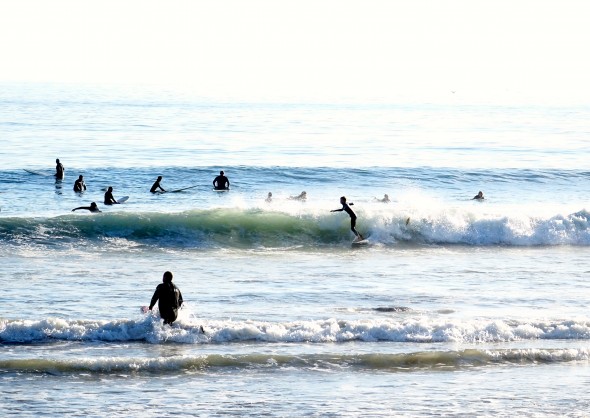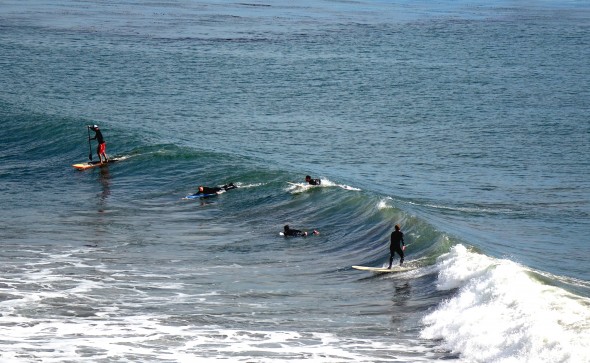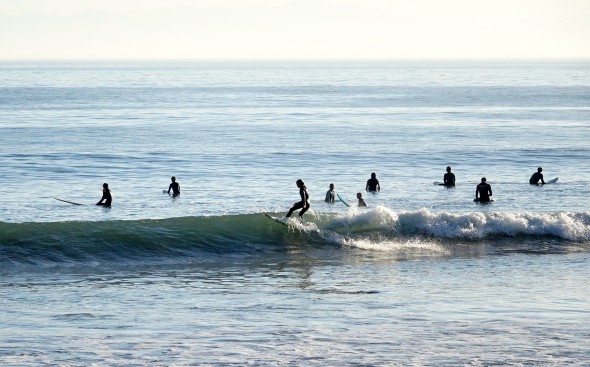 Well, this week we’ve got a few more people jumping into the waves with us and I’m so grateful for everyone’s rich contributions to the conversation. The story I shared this week was a personal one, unique to me in many ways. But as I read comments and links, I began to see that many of us had internalized similar ‘translations’ of that phrase — “More of Jesus, less of me.” Many of us have had to wrestle it out and realize that commitment to Jesus does not require self-obliteration. In fact, the opposite is true.
Well, this week we’ve got a few more people jumping into the waves with us and I’m so grateful for everyone’s rich contributions to the conversation. The story I shared this week was a personal one, unique to me in many ways. But as I read comments and links, I began to see that many of us had internalized similar ‘translations’ of that phrase — “More of Jesus, less of me.” Many of us have had to wrestle it out and realize that commitment to Jesus does not require self-obliteration. In fact, the opposite is true.
One linked essay linked early focused on the idea of the death of self as a process of rejuvenation, a coming of spring to a winter landscape. But the way is not easy; death never is. Another early subscriber phrased it differently: “we’re never more truly ourselves (as He created us to be) than when we’re revealing His glory and grace in our lives.”
 I loved this quote from David Benner in a thoughtful essay from across the pond:
I loved this quote from David Benner in a thoughtful essay from across the pond:
Surrender of ego would be surrender of personhood, which is never appropriate. We cannot be human without ego, and we can never be fully human without a strong ego. In many people, ego is too weak for them to engage in meaningful surrender. Without a strong ego we cannot engage in the transformational journey of ego relativisation through surrender of egocentricity and the reestablishment of a life-giving connection to the Self.’
This writer chose the word ‘diminishment’ as a descriptor for what this phrase, and others like it, seem to imply. “The problem with the way I understood diminishment lay in the way it led me to see my own Self. There was something wrong with it. With me. Why else would I need to diminish. It conjured up a picture of Jesus unhappily trying to find space to live within me and me just not moving enough stuff out of his way.”
Our resident poet, in her usual lovely and succinct way wrote this:
Totally lost, totally found.
It is the world in me that I want to replace with the Christ in me.
That I might have space to be the real version of _____.
The daughter He designed with great skill and precision
Not less, but more.
Fractures healed, imperfect perhaps
but complete in ways I can’t quite imagine.
A longtime friend of mine joined in the conversation in the comments and on Facebook, where she posted this news item and her own commentary on it:
About Pope Francis: Last week during a banquet in Chicago, Cardinal Francis George revealed why the cardinals gathered in conclave last March elected Bergoglio pope. George said: “Because the cardinal from Argentina was completely free. He possessed an interior freedom that was so evident.”
Is it not this unflinching freedom that allows Pope Francis to do what he does because he is unafraid and totally free to be himself at the same time of being such faithful son of the Church?
Yes! “An interior freedom” that allows for authenticity and faithfulness to tradition at the same time. I loved this!
 Several of our contributors come from hyper-restrictive backgrounds, where there was much personal pain, isolation and grief connected with the loss of self which this phrase can evoke. One linked essay spoke of feeling completely cutoff from her own humanity while spending time in a demanding fellowship: “If Jesus is this intangible ‘feeling’, a presence in only certain places, and me is…..me and my junk – then of course it’s logical to spend as much time in the literal presence of God and ignore my literal humanity.” This group went beyond scripture in its interpretive zeal, causing deep scars and lasting pain.
Several of our contributors come from hyper-restrictive backgrounds, where there was much personal pain, isolation and grief connected with the loss of self which this phrase can evoke. One linked essay spoke of feeling completely cutoff from her own humanity while spending time in a demanding fellowship: “If Jesus is this intangible ‘feeling’, a presence in only certain places, and me is…..me and my junk – then of course it’s logical to spend as much time in the literal presence of God and ignore my literal humanity.” This group went beyond scripture in its interpretive zeal, causing deep scars and lasting pain.
In the comments, one reader wrote about the healing that followed a time of struggle in a particular community: “Fast forward to later years when a particularly damaging season in church life had left me feeling “much less than” and very weary. After uprooting to a smaller fellowship, I remember standing in a sweet worship time and we began to sing a new song (new to me at least) titled “Your Beloved”. The words washed over me, they were life-giving. It was for me a transforming moment; healing had begun.” Music can be such an instrument of healing, can’t it?
 A mom of young kids, who also teaches high school students, wrote that she sees selfishness play out on a daily basis. Yet she still worries about the impact of teaching songs like JOY and using phrases like ‘less of me.’ “I have seen the heart of it twist and turn until it is knotted into a lie that says “don’t do anything you want to do. If you enjoy it, it isn’t from God.” I have seen it in my own heart the part that says, “Don’t pick yourself, don’t pick your dreams, if Jesus wants you to do the thing you will love, someone else will ask you to do it.”
A mom of young kids, who also teaches high school students, wrote that she sees selfishness play out on a daily basis. Yet she still worries about the impact of teaching songs like JOY and using phrases like ‘less of me.’ “I have seen the heart of it twist and turn until it is knotted into a lie that says “don’t do anything you want to do. If you enjoy it, it isn’t from God.” I have seen it in my own heart the part that says, “Don’t pick yourself, don’t pick your dreams, if Jesus wants you to do the thing you will love, someone else will ask you to do it.”
 I so appreciated this thoughtful questioning in one of the earliest linked essays:
I so appreciated this thoughtful questioning in one of the earliest linked essays:
It strikes me that there are many ways to answer that question because there are many ways to understand it. For example, what does “me” mean? Does it mean my willfulness and self-absorption? Or does it mean my essence? . . .
I love to hear Jesus’ voice calling me out, coaxing me to relax my strangle hold on life’s guardrails because there’s nowhere I can fall where He is not. I long to drop the constraints and fear and run far and high. I want to step into the flow of a larger design, where the rhythm of my giftings finds intrinsic place. A place not where I am lost, but where I am found. I want to come out of hiding.
A late commenter quoted Dallas Willard, a man who has taught beautifully about the need for good self-discovery AND learning to yield to the sweet, sometimes painful, work of the Spirit in us:
“As Jesus’ disciple, I am his apprentice in kingdom living. I am learning from him how to lead my life in the Kingdom of the Heavens as he would lead my life if he were I.” Dallas Willard
I first heard this quote a few years ago and something about it felt significant to me. It seems subtle, but there was something different about thinking how would Jesus live my life. It was a move away from an image I believe I held of us all becoming Jesus robots. Not the goal of me and you and everyone becoming Jesus. But me becoming more me. The redeemed me. The fully me that I was created to be. With my personality, gifts, experiences, quirks….fully being me- yoked with Jesus and the wisdom that he would bring into my life.
It was that phrase ‘Jesus-robots’ that clicked with me. I think — even though I had no concept of a robot in the early 1950s — that this idea was part of my almost primal fear of this whole line of thinking. I was grateful to find it put into words by someone else!
Every single voice is welcome in this rich conversation we are having and I am so thankful for each of you who is offering thoughtful words. My friend from New Zealand gave me one of the best word pictures for what I was trying to talk about in my own essay – and I don’t want anyone to miss these good words. She does not blog, but always leaves great stuff in the comments – so I suggest you subscribe to those, if you don’t already. I’ll wrap up this wrap-up with her words:
I’ve been thinking about the phrase ‘More of Jesus, less of me’ since you set this week’s questions, and the way so many people I know, particularly women, seem to use this as a command to invisibility, and how uncomfortable and wrong this feels to me.
I’ve also been thinking about light and transparency, and somehow the two things came together. When I try to get a photo of something – redcurrants or waves – that has light shining through it, I’m not trying to get a photo of the light itself. I’m trying to get a photo of how the light is making that particular thing look. The light is revealing something about the redcurrant or wave that I don’t usually see, something that is beautiful and/or unique.
Now apply this analogy to us. The light is Jesus in us. He shines through us, and as He does, the light somehow illuminates all our unique and very different qualities. Some of these qualities we are born with, and some are created as we walk through our lives, but it is the light of Jesus that shows them off. Given that God loves differences, I just can’t imagine Him wanting to look at a whole roomful of stained-glass windows (if that’s how we see ourselves… or jewels, or lanterns, or waves, or redcurrants, or whatever picture works for you!) that look exactly the same!
AMEN!
My deep thanks to each and every one of you who has written words in this space or elsewhere. As our small community grows, it will be increasingly difficult for me to include everybody in this weekly summary — each of these first two weeks, we’ve had about 20 different people contributing to the comments section, and 7 essays linked. I will continue to feature highlights, as I am able. Please know that I read everything you write and that I’m grateful for all of it.
Come back on Friday for our weekend pondering of” “What’s with all the talk about ‘sin?'”
























to be called “resident poet”
I am humbled, tear filled
the broken parts of me
tremble in that light
but thank you
that the words He provides
in fractured prose would
touch another’s heart
You are our resident poet, Karin. I’m always grateful for your words.
Wow, such rich words, Diana! I love that phrase, “Jesus roots” too. And, yes, this discussion goes perfectly with my playdates post. Thanks for pulling me in. Good thoughts.
‘LOVE that analogy from your New Zealand friend about light on waves and currants. Indeed, it is the light of Jesus that highlights our best qualities, which He put there in the first place. Thank you, Diana, for sharing these wonderful tidbits from your readers!
I love it, too, Nancy. Thanks for reading and for commenting!
If I am reading the New Testament right, it seems to leave no room for “creativeness” “self”, even in a metaphorical sense. Our whole destiny seems to lie in the opposite direction, in being as little as possible ourselves, acquiring a fragrance that is not our own but borrowed, in becoming clear mirrors filled with the image of a face that is not ours.
I guess we read the New Testament differently, then, Tony, because I see no evidence of extinction or absorption there. I do see language of resemblance and great encouragement to learn and grow and discover who it is God is forming us to be. Yes, we will look like Jesus – hopefully more and more as time passes and as we grow deeper in faith and relationship. But we will also look like the person God had in mind when we were created, that totally unique, no-one-like-us, inimitable person we are. Both things are true.
I agree, thanks